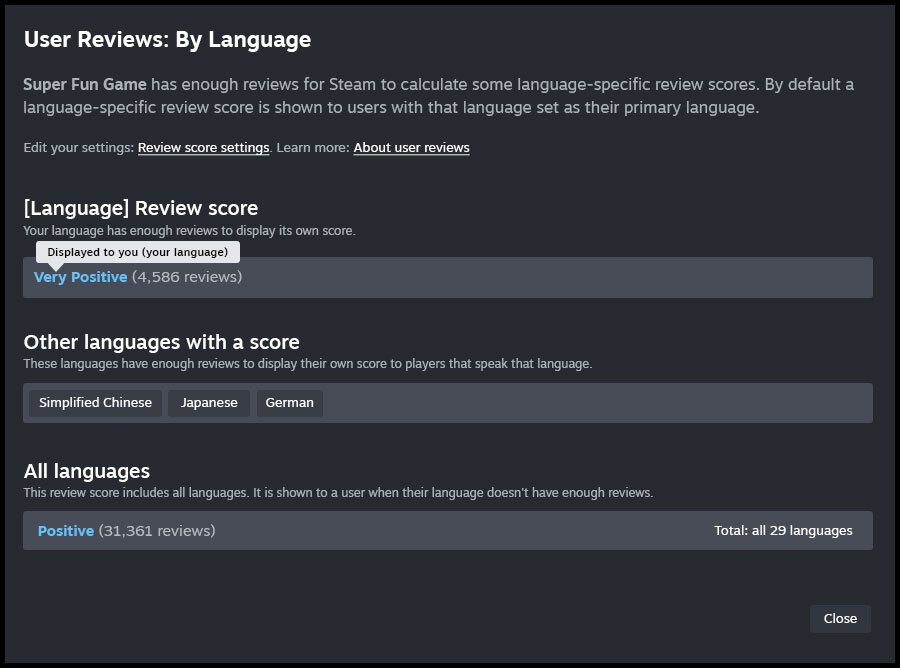After crashing stores left, right and center, Hollow Knight: Silksong reviews have started to pour in, but on Steam, the game helped a fairly new feature that Valve’s digital storefront launched back in August: enter the Steam language reviews.
You’d be forgiven if you didn’t read much about it since, as platform core updates go, this one was pretty minor. But alas, all things change and, in this case, what was once an easy-to-ignore update might open up a new front in the fight against review bombing, as well as bringing more transparency by breaking down sales numbers and helping users and companies to understand the public’s true desires when it comes to its gaming.
Steam language reviews: here’s why it’s important

Originally released on August 18th, the Steam language reviews feature does exactly what the name implies: it lets you choose specific languages for any given game’s critics and analysis, promising a deeper understanding on how well (or “not well”) a game does in specific regions of the world.
Taking Hollow Knight: Silksong as an example, this became rather evident over the course of last week: at the time of this writing, the game had a staggering 96% user rating in English commentaries, while Simplified Chinese boasted…52%.
No, that doesn’t mean Asians hated the game: in fact, it is garnering favorable sales there as well. However, they do have some specific complaints that cater right into their — and only theirs — demographic: namely, the game’s localization used a somewhat archaic, almost poetry-like speech and mannerisms that didn’t quite vibe with the local crowd.
Ok, but what makes it so important?
Sales transparency is important, and Steam just made it more evident
Wanna know a quick curiosity about my home country, Brazil? Witcher 3: Wild Hunt is still wildly successful here, selling copies by the buckets even though the game originally came out in 2015. Sure, there are remasters and relaunches of this and that version, but mostly, Brazilian gamers praise the game’s voice localization. Most of us will argue it’s even better than the original, English-based one.
Now, the opposite is also true: Mortal Kombat X and Battlefield Hardline were both destroyed by local journalists and public, mostly due to its terrible Brazilian Portuguese voice overs (which chose to rely on famous singers instead of, you know, actual voice actors), and both titles sales were very inferior to the global average (in Battlefield’s case, it tanked so bad not even EA’s PR talk about it unless hard-pressed to).
The “global average” sales is the key part here: recently, Ubisoft was accused of hiding specific, region-related sales data in order to avoid showing Assassin’s Creed Shadows in a bad light. The game itself is pretty good, in my own opinion, and I can’t really make a statement on these allegations, but given the size of our global industry, that’s not something too out there to speculate.
However, Steam’s nifty function can put the clamps on that really fast: while the feature itself does not separate sales numbers by region, the fact that we know have a tool to understand the public’s complaints (when they exist) more correctly and, through that, have a better grasp of what to look for if we need information like, well, local sales figures.
And speaking of transparency…
Review bombing has a new, very tough opponent (thankfully!)
Pretty much every studio, every publisher making games today has to consider “review bombing” in its development process. The act of artificially tanking a game’s public perception due to an agenda you might not disagree with is a modern-day bane of society and should never have its own place when it comes to video games.
It is a problem, however, as more and more idiots people who are afraid of the acronym “DEI” use that to destroy the results of a game that dared to have a female protagonist, or portray a character that just so happens to have a case of the gay/trans, completely ignoring that said characters have great, endearing qualities and personalities despite gender or sexuality (or, even better, can have their writing fleshed out because of these qualities).
While not a full on solution to this problem, Steam’s language-specific reviews might shed some light on how a game is doing globally versus its local performance—and why eventual, seemingly unnatural discrepancies have shown up. This might be a start for companies to better communicate themselves against these people, after identifying that most negative comments about a game focus on one or two aspects instead of a more constructed opinion and, therefore, stop coordinated bombing campaigns for ever gaining traction.
Better public perception = Better games made
Probably the biggest benefit of all, Steam’s language-specific reviews feature will allow companies to be called out and put on the spot if they willingly choose to ignore the public’s wishes. And make no mistake, they will have some explaining to do because of this.
You see, when you have a tool that gives you such an under-the-focused-lens understanding of what certain demographics want, then the company behind a product can choose to engage with those desires and meet them completely or halfway…or not to change anything at all.
Thing is, even though the latter option is still possible, before this new resource came around, we wouldn’t really know if a game’s publisher was serious about “listening to public feedback” like their news alerts oh-so-loves to say. Now, though, we will see the same average data as they will, and if they decide not to act upon it, then we will have the ammunition to hold them accountable—and that’s something any PR and Marketing executive dreads, as they’re usually the first line of defense when it comes to a company having to justify itself to anyone.
Basically, the “excuse-making” part of the process just became a lot harder for them, with good reason, as every bit of communication coming out of a company will have to be more precise, well-thought and target a specific problem instead of massively distributing an “overall rounded” press release that says too much and tells too little.
Granted, this is not a be all, end all solution for Steam, as we have other platforms to watch out for as well, but given the fact that Valve’s platform is perceived as the medium to infer the public’s opinion on any game, this just might be the spark that ignites the kindling.
At least for PC gaming purposes, this should work wonders. Here’s to waiting for PlayStation, Xbox and Nintendo to come up with similar solutions on their side, too. After all, it’s not every day we get to put giant, billionaire companies in the spot in a way they don’t control, eh?


